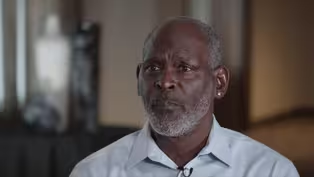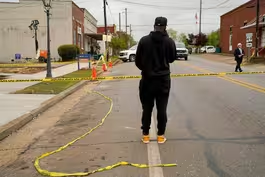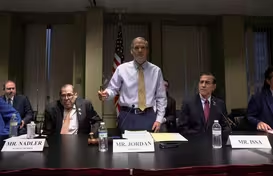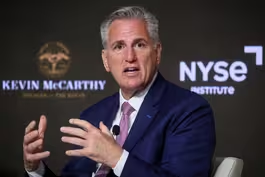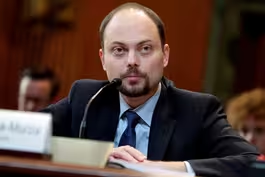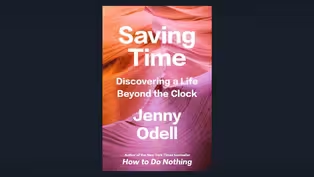
A Brief But Spectacular take on the future of CRISPR
Clip: 4/17/2023 | 3m 26sVideo has Closed Captions
A Brief But Spectacular take on the future of CRISPR
Jennifer Doudna is a Nobel laureate in chemistry and professor of biochemistry, biophysics and structural biology at the University of California, Berkeley. She has been a pioneer in CRISPR gene editing and continues to revolutionize research in her field. Doudna shares her Brief But Spectacular take on the future of CRISPR.
Problems playing video? | Closed Captioning Feedback
Problems playing video? | Closed Captioning Feedback
Major corporate funding for the PBS News Hour is provided by BDO, BNSF, Consumer Cellular, American Cruise Lines, and Raymond James. Funding for the PBS NewsHour Weekend is provided by...

A Brief But Spectacular take on the future of CRISPR
Clip: 4/17/2023 | 3m 26sVideo has Closed Captions
Jennifer Doudna is a Nobel laureate in chemistry and professor of biochemistry, biophysics and structural biology at the University of California, Berkeley. She has been a pioneer in CRISPR gene editing and continues to revolutionize research in her field. Doudna shares her Brief But Spectacular take on the future of CRISPR.
Problems playing video? | Closed Captioning Feedback
How to Watch PBS News Hour
PBS News Hour is available to stream on pbs.org and the free PBS App, available on iPhone, Apple TV, Android TV, Android smartphones, Amazon Fire TV, Amazon Fire Tablet, Roku, Samsung Smart TV, and Vizio.
Providing Support for PBS.org
Learn Moreabout PBS online sponsorshipAMNA NAWAZ: Jennifer Doudna is a Nobel laureate in chemistry and professor of biochemistry, biophysics and structural biology at the University of California, Berkeley.
She has also been a pioneer in CRISPR gene editing.
Tonight, Doudna shares her Brief But Spectacular take on the future of her field.
JENNIFER DOUDNA, Nobel Laureate Biochemist: Early in my work on CRISPR, I had a dream one night about a colleague of mine asking me to explain CRISPR to a friend of his.
And the friend turned out to be Hitler.
And it was Hitler with a pig face and a horrifying look that made me imagine some of the worst aspects of what genome editing could bring about if it were used irresponsibly.
And I woke up from that dream thinking that it was so critical that we as scientists think together about how we use our technologies responsibly.
I like to describe CRISPR as an editor for the genome.
It's a way of changing the code of life in a precise fashion, very much like we might edit a document.
With CRISPR, we can literally alter a single letter in DNA all the way up to a large segment of that text.
And that means that we can now correct disease-causing mutations and help address climate change.
Some of the ethical considerations around CRISPR focus on human health, especially altering human embryos.
And the reason that is such a profound use of the technology is that it results in changes that are made that are inheritable.
And so we have to really be thoughtful about how we would deploy a technology for that purpose.
The other area where there's a lot of talk is using CRISPR for environmental applications, meaning altering whole sets of organisms.
I think there's an extraordinary opportunity to address challenges of disease and, frankly, preventive medicine that haven't been possible in the past.
On the flip side, I do worry that the use of CRISPR and other technologies could get ahead of themselves.
So it's very important that scientists and technologists and engineers stay on top of this as these technologies develop.
In early October of 2020, I got a phone call.
It was a call from the Nobel Foundation in Stockholm, Sweden, telling me that I had won the Nobel Prize in chemistry that year with my colleague Emmanuelle Charpentier.
And what happened very shortly after that was that I realized that, for many people, especially women and girls who reached out to me, it was a symbol for them of what might be possible for all of us to achieve.
And that's what means the most to me about it.
Today, we're facing so many challenges in our society, inequities, challenges to our health, challenges to our environment.
And, with CRISPR, we have a technology that can, in principle, address all of these things.
It's a wonderful tool that we can use to manipulate ourselves and our environment in ways that will benefit the planet.
My name is Jennifer Doudna, and this is my Brief But Spectacular take on the future of CRISPR.
AMNA NAWAZ: And you can watch more Brief But Spectacular videos online at PBS.org/NewsHour/Brief.
Crosley Green returns to prison after conviction reinstated
Video has Closed Captions
Clip: 4/17/2023 | 9m 59s | Crosley Green returns to prison, maintains innocence after murder conviction reinstated (9m 59s)
Four dead in shooting at birthday party in Alabama
Video has Closed Captions
Clip: 4/17/2023 | 5m 49s | Four dead, 15 more wounded in shooting at birthday party in small Alabama town (5m 49s)
GOP targets DA bringing criminal charges against Trump
Video has Closed Captions
Clip: 4/17/2023 | 7m 19s | House Republicans hold NYC hearing targeting DA bringing criminal charges against Trump (7m 19s)
News Wrap: GOP plan raises debt ceiling with spending cap
Video has Closed Captions
Clip: 4/17/2023 | 4m 56s | News Wrap: McCarthy says Republicans will vote to raise debt ceiling with cap on spending (4m 56s)
Rival factions in brutal battle for control of Sudan
Video has Closed Captions
Clip: 4/17/2023 | 8m 6s | Civilians caught in crossfire as rival factions battle for control of Sudan (8m 6s)
Russian opposition leader jailed for denouncing Ukraine war
Video has Closed Captions
Clip: 4/17/2023 | 7m 38s | Russian opposition leader sentenced to prison for denouncing Putin's war in Ukraine (7m 38s)
'Saving Time' gives fresh perspective on the meaning of time
Video has Closed Captions
Clip: 4/17/2023 | 4m 35s | Jenny Odell's new book 'Saving Time' gives fresh perspective on the meaning of time (4m 35s)
Providing Support for PBS.org
Learn Moreabout PBS online sponsorship
- News and Public Affairs

FRONTLINE is investigative journalism that questions, explains and changes our world.

- News and Public Affairs

Amanpour and Company features conversations with leaders and decision makers.












Support for PBS provided by:
Major corporate funding for the PBS News Hour is provided by BDO, BNSF, Consumer Cellular, American Cruise Lines, and Raymond James. Funding for the PBS NewsHour Weekend is provided by...

